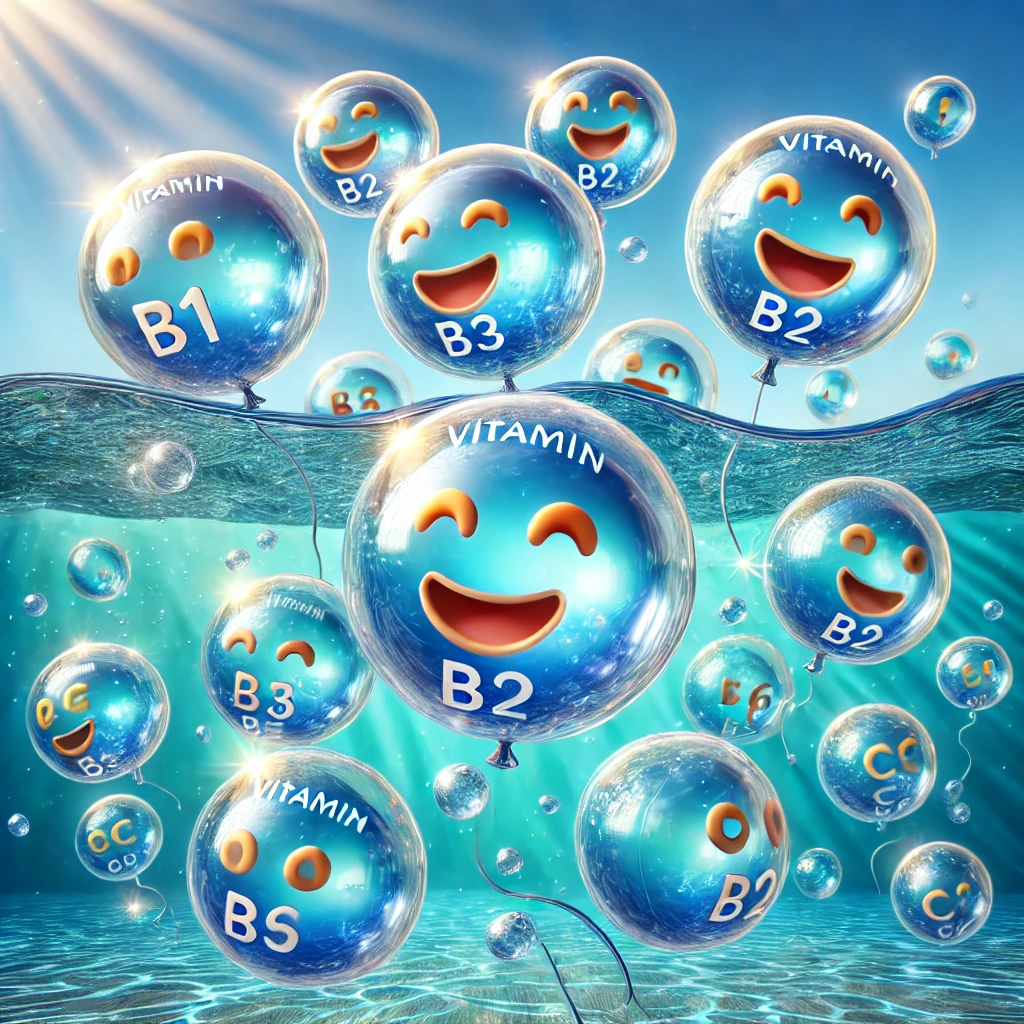Vitamins are classified into two types: water-soluble and fat-soluble. The Water-Soluble Vitamins List & Functions include Vitamin C and B complex, which dissolve in body fluids and are excreted through urine. This prevents toxicity and ensures a safe intake. In contrast, fat-soluble vitamins (A, D, E, and K) are stored in fat tissues and the liver, making excessive intake potentially harmful. A balanced diet ensures optimal intake of these essential nutrients. You can ccompete study about Water soluble vitamins list and functions from our website Clear Mind Haven in the USA.
Types of Water-Soluble Vitamins
Water-soluble vitamins include Vitamin C and B-complex vitamins, which play key roles in energy production, brain function, and cell health. The B-complex group consists of eight essential vitamins that support metabolism, nerve function, and red blood cell production.
What is Vitamin B1 (Thiamine)?
Vitamin B1 is essential for energy production, brain function, and overall health. A balanced diet rich in whole grains, legumes, and lean meats ensures adequate intake. While deficiency can lead to severe health issues, excess intake is usually harmless due to its water-soluble nature. You can better understand the importance of Vitamin B1 in preserving nerve health and energy levels by learning about water-soluble vitamins list and functions.
Functions of Vitamin B1
- Energy Production: Helps convert carbohydrates into energy.
- Nervous System Support: Maintains healthy nerve function and prevents nerve damage.
- Heart Health: Aids in proper heart muscle function.
- Brain Function: Supports cognitive abilities and memory.
- Digestive System: Helps maintain a healthy appetite and digestion.
- Sources of Vitamin B1
- Whole grains: Oats, brown rice, and whole wheat bread.
- Legumes: Lentils, beans, peas
- Meat & Fish: Pork, beef, chicken, salmon, tuna
- Nuts & Seeds: Sunflower seeds, flaxseeds
- Dairy & Eggs: Milk, cheese, eggs
- Fruits & Vegetables: Oranges, potatoes, spinach
Deficiency of Vitamin B1
- Beriberi: Weakness, nerve damage, muscle wasting.
- Wernicke-Korsakoff Syndrome: Severe memory loss, confusion, and loss of muscle coordination (common in alcoholics).
- Fatigue & Weakness: Chronic fatigue, muscle weakness, and difficulty performing daily activities.
- Poor appetite & weight loss: Loss of appetite (anorexia), leading to unintended weight loss.
- Irritability & depression: Mood swings, irritability, lack of concentration, anxiety, and depression.
Overdose of Vitamin B1
Excess thiamine is usually excreted through urine, making overdoses rare. However, very high doses (through supplements) may cause nausea & vomiting, allergic reactions (rash, itching, breathing difficulties in rare cases) and low blood pressure.
What is Vitamin B2 (Riboflavin)?
Vitamin B2 is vital for energy, metabolism, and overall health. A balanced diet rich in dairy, meats, and leafy greens ensures an adequate intake. Deficiency can cause skin issues and fatigue, while overdose is rare. The water-soluble vitamins list and functions highlight the importance of Vitamin B2 in energy production and cell repair.
Functions of Vitamin B2
- Energy Production: Converts carbohydrates, fats, and proteins into usable energy.
- Cell Growth & Repair: Supports tissue development and red blood cell formation.
- Antioxidant Role: Helps protect cells from oxidative stress and aging.
- Healthy Skin & Eyes: Maintains skin integrity and reduces the risk of cataracts.
- Nervous System Support: Aids in brain function and prevents neurological issues.
Sources of Vitamin B2
- Milk & Dairy Products (cheese, yogurt, Eggs).
- Lean Meats (chicken, beef, liver)
- Fish (salmon, mackerel)
- Whole Grains & Cereals
- Green Leafy Vegetables (spinach, kale, broccoli)
- Nuts & Seeds (almonds, sunflower seeds)
Vitamin B2 Deficiency Symptoms
A lack of riboflavin can cause cracked lips & mouth sores (cheilitis), swollen, red tongue (glossitis), dry, itchy eyes & sensitivity to light, skin disorders & rashes, fatigue & weakness, slow wound healing. Severe deficiency may lead to ariboflavinosis, which can cause anemia and nervous system disorders.
Overdose of Vitamin B2
- Rare Toxicity: Excess amounts of riboflavin are excreted through urine due to its water solubility.
- Possible Side Effects of High Doses: Bright yellow urine (harmless but noticeable), nausea or upset stomach (rare), increased risk of kidney stones (in extremely high doses).
What is Vitamin B5 (Pantothenic Acid)?
Vitamin B5 is essential for energy, brain function, and skin health. It is widely available in food, making deficiency rare. A well-balanced diet ensures optimal intake, while excess is naturally excreted. The water-soluble vitamins list and functions emphasizes the role of Vitamin B5 in stress management and energy metabolism.
Functions of Vitamin B5
- Energy Production: Converts nutrients into energy through CoA.
- Red Blood Cell Formation: Supports the production of healthy red blood cells.
- Brain & Nervous System Health: Helps in neurotransmitter synthesis, improving mental clarity and mood.
- Hormone Production: Supports adrenal gland function and stress response.
- Skin & Hair Health: Helps maintain healthy skin and reduces signs of aging.
Sources of Vitamin B5
Vitamin B5 is found in a variety of foods like meat & poultry (chicken, beef, turkey), fish & seafood (salmon, tuna), dairy products (milk, cheese, yogurt, eggs), whole grains & legumes (brown rice, lentils, chickpeas), avocados & vegetables (broccoli, sweet potatoes, mushrooms), nuts & seeds (sunflower seeds, peanuts).
Vitamin B5 Deficiency
Fatigue & weakness, irritability & depression, burning feet syndrome (pain and tingling in the feet), headaches & insomnia, digestive issues (nausea, vomiting, stomach cramps), muscle cramps & numbness.
Overdose of Vitamin B5
Possible side effects of high doses (>10 g per day) can cause nausea, diarrhea and an increased risk of dehydration.

What is Vitamin B6 (Pyridoxine)?
Vitamin B6 is essential for brain function, mood balance, immune support, and metabolism. A well-balanced diet usually provides enough B6, but deficiencies can occur with poor nutrition or certain medical conditions. While excess B6 from food is harmless, high-dose supplements can lead to nerve damage over time.
Functions of Vitamin B6
- Brain Health & Mood Regulation: Helps produce serotonin, dopamine, and GABA, reducing stress, anxiety, and depression.
- Red Blood Cell Production: Essential for hemoglobin formation, preventing anemia.
- Boosts Immune Function: Supports the body’s ability to fight infections.
- Supports Metabolism: Helps in breaking down proteins, carbohydrates, and fats for energy.
- Reduces PMS symptoms: Helps in balancing hormones, reducing mood swings and cramps.
- Promotes Heart Health: Lowers homocysteine levels, reducing heart disease risk.
Sources of Vitamin B6
- Meat & Poultry (chicken, turkey, beef)
- Fish (salmon, tuna)
- Dairy Products (milk, cheese, eggs)
- Whole Grains (brown rice, oats, wheat germ)
- Nuts & Seeds (walnuts, sunflower seeds, peanuts)
- Avocados and Bananas
- Vegetables (spinach, potatoes, carrots)
- Legumes (chickpeas, lentils)
Vitamin B6 Deficiency
Fatigue & weakness, irritability & depression, anemia (low red blood cell count), cracked lips & mouth sores, numbness & tingling in hands and feet, weakened immune system, cognitive issues (brain fog, memory problems).
Overdose of Vitamin B6
Safe Limits: The recommended daily intake is 1.3–2.0 mg for adults.
High doses (>200 mg per day for long periods) can cause nerve damage (numbness, tingling, loss of coordination), sensitivity to light, nausea, & digestive issues. Toxicity is rare from food sources but can happen with excessive supplements.
What is Vitamin B7 (Biotin)?
Vitamin B7 is essential for healthy hair, skin, nails, and metabolism. It helps the body convert food into energy and supports enzyme functions. The water-soluble vitamins list and functions underscores the importance of biotin in maintaining beauty and metabolic health.
Functions of Vitamin B7
Boosts Hair, Skin & Nail Health: Prevents hair thinning, brittle nails, and dry skin.
Aids in Metabolism: Helps break down fats, carbs, and proteins for energy.
Supports Brain Function: Improves cognitive function and mood regulation.
Regulates blood sugar: Plays a role in maintaining healthy glucose levels.
Strengthens Muscles & Tissues: Supports muscle recovery and reduces inflammation.
Sources of Vitamin B7
Egg yolks, avocados, nuts & seeds (walnuts, almonds, peanuts, sunflower seeds), liver & meat, vegetables (sweet potatoes, spinach, broccoli), dairy products, bananas & whole grains.
Vitamin B7 Deficiency
Hair loss (alopecia), brittle nails, skin rashes, fatigue, weakness, depression, mood swings, nerve issues (tingling sensation in hands & feet)
Overdose of Vitamin B7
Safe Limits: No upper limit is set, but 30-100 mcg per day is recommended.
High doses can lead to skin rashes, digestive issues & interference with lab tests (false readings on blood tests). Excess biotin is usually excreted in urine, making toxicity very rare.
What is Vitamin B9 (Folate/Folic Acid)?
Vitamin B9, known as folate (natural form) or folic acid (synthetic form), is essential for DNA synthesis, red blood cell formation, and fetal development. The water-soluble vitamins list and functions highlight the critical role of folate in preventing birth defects and supporting cell growth.
Functions of Vitamin B9
- Supports DNA & Cell Growth: Crucial for growth and repair of cells.
- Prevents Birth Defects: Essential during pregnancy to prevent neural tube defects.
- Boosts Red Blood Cell Production: Prevents anemia.
- Enhances Brain Function: Improves memory and reduces dementia risk.
- Supports Heart Health: Lowers homocysteine levels, reducing stroke risk.
Sources of Vitamin B9
Leafy greens (spinach, kale, lettuce), vegetables (broccoli, asparagus, beets), citrus fruits (oranges, lemons), legumes & nuts (lentils, chickpeas, peanuts), fortified grains, eggs & cereals.
Vitamin B9 Deficiency Symptoms
Fatigue & weakness, pale skin & anemia, shortness of breath, birth defects in pregnant women, irritability & depression.
Overdose of Vitamin B9
Safe Limits: 400 mcg per day for adults, 600 mcg for pregnant women.
Excess Can Cause: Digestive Issues, Insomnia & Mood Swings.
What is Vitamin B12 (Cobalamin)?
Vitamin B12, also known as cobalamin, is a crucial water-soluble vitamin necessary for nerve function, red blood cell formation, and DNA synthesis.
Functions of Vitamin B12
- Supports Nerve Health: Prevents nerve damage and neuropathy.
- Boosts Energy & Red Blood Cells: Prevents anemia and fatigue.
- Enhances Brain Function: Reduces memory loss and supports mental clarity.
- Aids DNA Synthesis: Essential for cell replication and repair.
- Protects Heart Health: Lowers homocysteine levels, reducing cardiovascular risks.

Sources of Vitamin B12
- Animal Products (beef, liver, chicken)
- Fish & Seafood (salmon, tuna, shellfish)
- Dairy Products (milk, cheese, yogurt, eggs)
- Fortified Cereals & Plant-Based Milks. Vegans & vegetarians need B12 supplements or fortified foods.
Vitamin B12 Deficiency
Fatigue & weakness, pale skin & anemia, nerve damage (tingling in hands & feet), memory loss & confusion, depression & mood swings.
Overdose of Vitamin B12
Safe Limits: 2.4 mcg per day for adults.
Excess B12 is usually excreted, but very high doses may cause mild headaches & dizziness, acne & skin issues, imbalance in potassium levels,
What is Vitamin C (Ascorbic Acid)?
Vitamin C, or ascorbic acid, is a powerful antioxidant essential for immune function, skin health, and iron absorption.
Functions of Vitamin C
- Immunity Booster: Promote body’s defense to fight against infections.
- Promotes Skin Health: Enhances collagen production for healthy skin.
- Supports Wound Healing: Speeds up recovery from injuries.
- Improves Iron Absorption: Prevents anemia.
- Acts as an antioxidant—protects cells from damage and reduces inflammation.
Sources of Vitamin C
Citrus fruits (oranges, lemons, grapefruits), berries (strawberries, blueberries), bell peppers, broccoli & cauliflower, tomatoes, mangoes & papayas.
Vitamin C Deficiency
Weak immune system (frequent colds & infections), bleeding gums & tooth loss, fatigue & weakness, dry skin & slow wound healing, joint pain & swelling.
Overdose of Vitamin C
Safe Limits: 75-90 mg per day for adults.
Excess (>2,000 mg per day) can cause stomach cramps and diarrhoea, kidney stones, nausea, and acid reflux.
The water-soluble vitamins list and functions are essential to understand for maintaining good health. These vitamins are vital for overall health but must be consumed daily, as they are not stored in the body. A balanced diet rich in whole foods, fruits, vegetables, lean proteins, and whole grains ensures optimal vitamin intake. If dietary intake is insufficient, supplements may be recommended under medical guidance.
Want to Read More?
- Read more about [How Essential Vitamins for Health Help Protect You from Diseases]
- Stay connected with us. Click here


1 Comment
Pingback: Natural Vitamins vs Supplements: Which is better for Your Health? - clearmindhaven.com